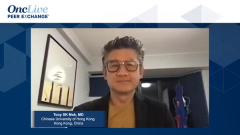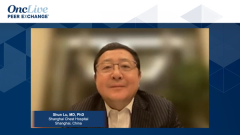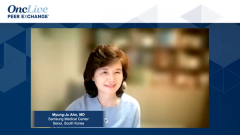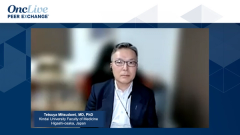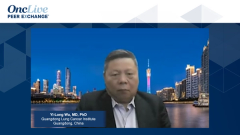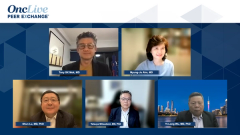
Regional Recommendations and Approaches to Biomarker Testing in NSCLC
Expert oncologists from key Asian countries share guidelines for biomarker testing in their countries and how biomarker testing is being used for non–small cell lung cancer in their region.
Episodes in this series

Transcript:
Tony S.K. Mok, MD: Welcome to this OncLive® Peer Exchange® program focusing on EGFR mutation, from biomarker testing to early stage disease to advanced disease. I’m Professor Tony Mok from Chinese University of Hong Kong. I’m a thoracic oncologist focusing on targeted therapy, immunotherapy, and biomarkers. With me depending I have 4 dear colleagues from Japan, Korea, and China. Allow me to introduce them, and then they can introduce themselves. The first is Professor Myung-Ju Ahn from Korea. Myung-Ju, would you like to introduce yourself?
Myung-Ju Ahn, MD: Hello, my name is Myung-Ju Ahn. I’m a medical oncologist from the Samsung Medical Center in [Seoul], South Korea. I’m delighted to join this meeting.
Tony S.K. Mok, MD: The second is my good friend from Shanghai [China], Professor Lu Shun.
Shun Lu, MD, PhD: Hello, everybody. I’m Dr. Shun Lu from Shanghai Chest Hospital at Shanghai Jiao Tong University [in Shanghai, China]. I’m a thoracic oncologist. I’m happy to join this meeting.
Tony S.K. Mok, MD: Third is Professor Tetsuya Mitsudomi from Osaka [Japan].
Tetsuya Mitsudomi, MD, PhD: Thank you, Tony. My name is Tetsuya Mitsudomi. I’m professor of thoracic surgery at Kindai University in Osaka, Japan. I’m happy to be invited and looking forward to the discussion.
Tony S.K. Mok, MD: He’s also the immediate past president of IASLC [International Association for the Study of Lung Cancer]. Last but not least is Professor Yi-Long Wu.
Yi-Long Wu, MD, PhD: Hi, everybody. I’m Yi-Long Wu, a thoracic surgeon at Guangdong Lung Cancer Institute at Provincial People’s Hospital in Guangzhou [China]. I focus on thoracic surgery and targeted immunotherapy for lung cancer. I’m happy to join the discussion.
Tony S.K. Mok, MD: Thank you so much. All of us are good friends over the years. We’re talking about a favorite subject of our research, which is EGFR mutation. We have 3 modules. The first module is going to focus on the biomarker, not limited to EGFR but generally the biomarker and the guidelines involved in it. Second is the role of adjuvant therapy, especially in EGFR-positive lung cancer. The third part is the how to manage, the most updated data from these recent conferences on metastatic stage IV EGFR-positive lung cancer. This has been a busy year. There’s a lot of new data that came out in the past year and in the year before. I’m going to put everything together and get the best of the best in Asia [to determine] how it this is relevant to our practice in Asia-Pacific and China.
Why don’t we kick off with module No. 1 on the biomarker testing? Apart from EGFR, ALK, and ROS1, we’ve got multiple uncommon mutations: RET, MET 14 skipping, BRAF. The question is, what’s the best approach in capturing this mutation, and what’s the standard of practice? I’d like to hear from each of you about your practice, the guidelines, and the leading method of testing in your country. Why don’t we start with the lady? Myung-Ju, in Korea, what is the practice of molecular genetic testing in general?
Myung-Ju Ahn, MD: We do the molecular test for all patients diagnosed with advanced non–small cell lung cancer. The molecular test includes EGFR, ALK, ROS1, BRAF, and the PD-L1 expression. If the patient is negative for the full molecular test, then we proceed to the next-generation sequencing [NGS]. That’s our usual practice.
Tony S.K. Mok, MD: So you’re adopting sequential testing?
Myung-Ju Ahn, MD: Yes, because most drugs are not available so far. That’s the main reason.
Tony S.K. Mok, MD: I’ll go back to you in a moment. Let’s hear from China as well. Lu Shun, what is the practice in Shanghai?
Shun Lu, MD, PhD: In Shanghai, we follow the guidelines not only for the global guidelines, like the NCCN [National Comprehensive Cancer Network] Guidelines, as well as the ESMO [European Society for Medical Oncology] Asia guidelines. Also we have the local China guidelines, like the CSCO [China Society of Clinical Oncology] guidelines. For the advanced and metastatic settings, we’ll routinely use the NGS or PCR to test the EGFR, BRAF, ROS, MET exon 14 skipping mutation, and RET. These are common hot spots. We’ll routine test the PD-L1 expression as well, using immunohistochemistry.
Tony S.K. Mok, MD: And in Japan, Tetsuya?
Tetsuya Mitsudomi, MD, PhD: In Japan, we’re happy that many drugs are already available. So the EGFR, ALK, ROS1, BRAF, MET and RET [INAUDIBLE] are available with the reimbursement. They generally recommend to test all these genes for the mutations or the fusions. Of course, PD-L1 testing is mandatory. People gradually change to do the individual testing- the Oncomine NGS testing.
Tony S.K. Mok, MD: Is Guangzhou any different, Yi-Long?
Yi-Long Wu, MD, PhD: Thank you, Tony. Generally, the practice guidelines in Shanghai are the same as what Lu Shun said. In China, we had the strategy to the test the biomarker. First, all the guidelines demand that all the patients with early or advanced disease needs to test the PD-L1 and the driver gene. The driver gene creates so many, such as the EGFR, ALK, ROS1, and so on. We have 2 mechanisms. One is the 1-by-1 test. This is most used in the countryside or in the lower level of the hospital. So this is the 1. But most of the bigger hospitals are using NGS to test all the genes in 1 test. In the long term, within China, because it’s so big, this will be the chosen strategy. But also the paradigm is ongoing.
Transcript edited for clarity.


